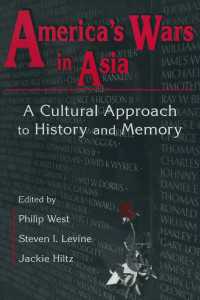基本説明
Through an 'ethnography of ethnographers', this volume explores the varied ways in which anthropologists become and remain attracted to the discipline.
Full Description
Through an 'ethnography of ethnographers', this volume explores the varied ways in which anthropologists become and remain attracted to the discipline. The contributors reflect on the initial preconceptions, assumptions and expectations of themselves as young anthropologists, and on the ways in which early decisions are made about fieldwork and about the selection of field locations. They question how fieldworkers come to understand what anthropology is, both as a profession and as a personal experience, through their commitments in the field, in academic departments and in contexts where their 'specialist knowledge' is called upon and applied. They discuss the nature of reflexivity that emerges out of anthropological practices, and the ways in which this reflexivity affects ethnographic practices. Providing reflections on fieldwork in such diverse places as Alaska, Melanesia, New York and India, the volume critically reflects on the field as a culturally constructed site, with blurred boundaries that allow the personal and the professional to permeate each other. It addresses the 'politics of location' that shape the anthropologists' involvement in 'the field', in teaching rooms, in development projects and in activist engagements. The journeys described extend beyond 'the field' and into inter-disciplinary projects, commissions, colleges and personal spheres. These original and critical contributions provide fascinating insights into the relationship between anthropologists and the nature of the discipline.
Contents
Preface and Acknowledgements; Chapter 1 Introduction: Producing Fields, Selves and Anthropology, Maya Unnithan-Kumar, Geert De Neve; Chapter 2 'What I want is for Florida orange growers to know why it is important for us to whale': Learning to be an Anthropologist in the Field, Barbara Bodenhorn; Chapter 3 The Multi-Sited Ethnographer, Simon Coleman; Chapter 4 Others In and Of the Field: Anthropology and Knowledgeable Persons, Narmala Halstead; Chapter 5 Hidden Reflexivity: Assistants, Informants and the Creation of Anthropological Knowledge, Geert De Neve; Chapter 6 Writing as a Kind of Anthropology: Alternative Professional Genres, Anthony Good; Chapter 7 Among the Crowds: Learning Anthropology and Learning Multidisciplinarity, Rachael Gooberman-Hill; Chapter 8 Sensing the Field: Kinship, Gender and Emotion in an Anthropologist's Way of Knowing, Maya Unnithan-Kumar; Chapter 9 Part icipant Experience: Learning to be an Acupuncturist, and Not Becoming One, Elisabeth Hsu; Chapter 10 'Working in the Metropolis': Reflections on Gender and Fieldwork in the City, Henrike Donner; Chapter 11 The Silence in Between: Governmentality and the Academic Voice in Tibetan Diaspora Studies, Martin A. Mills;







